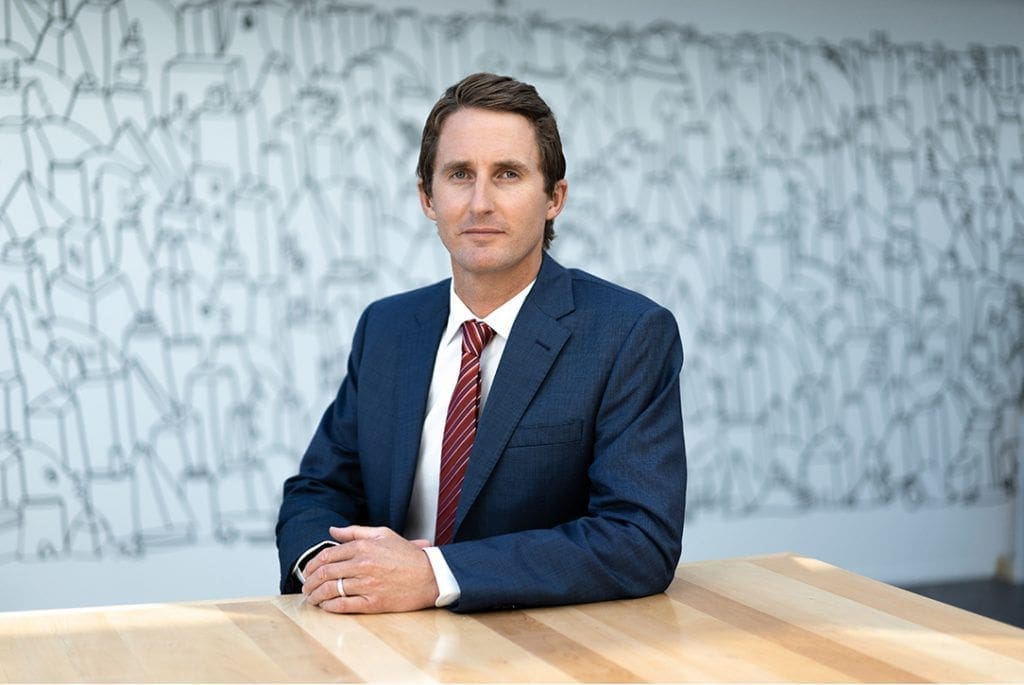Property Management Of The Future
Aside from the changes to the property market forced by a global pandemic, New Zealand renters and landlords are already part way through a shift in the quality of rental properties thanks in part to regulations like the Healthy Homes standards, but also to a growing awareness of the long term impacts of living in substandard environments. Further driving this though are smart New Zealand companies, like Tether, which accurately measures temperature and humidity and air quality within the home in order to be able to make informed decisions to maximise health and comfort for occupants. Working with Tether is one of New Zealand’s top real estate and property management companies, Property Brokers, who are helping to advance the quality of life for tenants but also giving peace of mind to landlords. We speak to the founder of Tether, Brandon van Blerk, and General Manager – Property Management for Property Brokers, Will Alexander, about the future of living.
How does the renaissance of property management look?
Will Alexander: Property management was deregulated in 2010 and basically, you could do whatever you want. When I first started a long time ago, you could see it was an industry where it was just so antiquated, it fell off the radar with the government when they deregulated it.
It’s been sitting in this holding pattern for a long time, a decade. The whole industry has been lobbying, saying we need regulation. we want to be regulated. How many industries say that?
The technology side of stuff has just been server-based systems, VPNs and working from home. Then you get cloud-based products coming into the market now, like Tether, that have just changed everything.
Now, finally Labour have said that it’s on the cards to regulate it. But behind all of that, the industry, with the technology, are now becoming a really good service. We can provide the service. So, coupled with the regulation, we can do great jobs now that we have the technology to provide a fantastic service for tenants, for owners, for tradespeople – you name it.
That’s the renaissance of property management. It’s needed to happen for a long time.
It’s interesting that you say that because common perception would be that it requires a free market and a lack of regulation to inspire innovation, but you’re saying the opposite.
WA: Yeah, absolutely. When you de-regulate a market, people get away with lots of stuff. Roughly $5 billion of rents come through managed agencies per year. Those are big numbers. That’s based on 50 percent of the rental market.
The full rental market is roughly about $660,000. That’s $10 billion of rental money getting paid by tenants, either into a trust account or someone’s bank account. None of that is regulated and so when no one’s putting the spotlight on you, or there’s no governance, then your standards come down.
For those of us that are passionate about the industry, it’s good to have competition, it’s good to have someone looking at you because your standard comes up and you operate at a far better level.
What starts to happen when you don’t have that spotlight?
WA: Every professional agency has a trust account and a lot of the major brands, like Property Brokers, have an audited trust account. We’re absolutely open and you can come and check our books any day of the year, we’ve got nothing to hide.
But that’s not always the case and there’s been some really high profile incidents over the last decade where tenants have been paying bonds, for example, and that’s just been going straight into someone’s bank account and they’ve been funding their lifestyles with that money.
That’s at all levels; large brands through to just standalone mum and dad property investors. That’s what’s been happening.
What is happening at the moment in terms of this renaissance?
WA: People like Brandon are coming into the market. He’s bringing in a completely different perspective and a new standard that the industry hasn’t seen.
Brandon van Blerk: You touched on the whole idea of regulation and how innovation sometimes doesn’t go hand in hand with regulation. I kind of disagree with that because what regulation does is it provides friction in a system.
Regulatory systems are inherently quite friction-full and they provide all this process and stuff that you have to get through. The opportunity always lies in the time when regulation first gets brought in and an industry starts to grapple with what that regulation actually means. That gives people like myself an ability to make that regulation easier by providing innovative solutions.
There’s no government on the planet that goes, ‘Here’s some regulation and a whole bunch of awesome tools to make it easier for you and us.’ No, they go, ‘Here’s some laws that we’ve put in place, which we have thought somewhat about, but we don’t really know the impact, but you have to comply with them.’
The industry goes, ‘This is insane. How are we going to do this? It’s all this added cost and friction in the system.’ People like myself and others ask, ‘How are we going to solve this? How are we going to actually make the regulation easier for you?’ Because you have to comply.
It does provide some frameworks and some guidelines for the industry to abide by, but also provides some maturity and some good things for the industry. But, you want to have those guidelines without actually having the friction that comes with it.
How you solve that is with the innovation piece; automation, integration, having cloud-derived systems, connected systems. You don’t have all these disparate things.
There’s multiple ways to solve the problem and I can talk about how we’ve started to solve them in the property management industry, but ultimately it’s this constant game between adding friction, removing it, adding friction and removing it.
The opportunity comes when the friction is added, not when it’s removed. Once everything’s in a free flow system, there’s no opportunity there. Everyone’s happy, you’re just moving on. As soon as you add friction to the system, then the opportunity starts and you can go innovate.
The people that are willing to take the risk and understand that there’s actually opportunity in removing that friction, which is a risk, let me tell you; they either win and the solution that ends up being a step change in the way people do things, or they lose a whole bunch of money in their business and the industry continues to be friction-full.

Before we have an argument about pre-market versus regulation, we should actually talk about what the regulation is, what the aims are and what sort of changes are there.
WA: It’s all about improving the experience for all stakeholders. That’s tenants, that’s owners, that’s agencies, that’s everyone. The regulation is about providing a better standard of living, which everyone supports. Everyone supports the fact that it doesn’t matter who you are, you should live in a warm, dry home. That’s what the regulation is about. It’s absolutely positive.
The challenge is the cadence in which this has come out and the last five years have just been bam, bam, bam, bam, bam. It’s not about not supporting it. We absolutely do, it’s just the fact that we’re all going, ‘Woah, give us a second here.’
And it’s not just us. We’re the administrators, we’re the property managers that have to absorb all this, understand what they’re doing, read the legislation, come up with an action plan, sell this to the owners and say, ‘This is what you need to do. It is a good thing to do.’ You will at the end of the day increase the value of the property.
But, we’ve all got a hammering and it’s change fatigue. It would happen to any industry. It doesn’t matter what you do, when you have this much change in such a small period, that’s the challenge. But at the end of the day, it’s all for the right reasons.
It’s for healthy living and it’s to support generation rent. If you rent a property in Europe, you rent a property for a generation. It’s very different. You would rent a property and you would remodel it. You’d put in a kitchen, you’d put in a bathroom and you’d rent it for decades.
When I started in property management, my average tenancy was six months. Tenant comes in, rents the property, leaves in six months, we turn it over, we rent it. Across Property Brokers now, the average tenancy is 26.7 months and in some regions, like West Coast, Wairarapa, Hawke’s Bay, it’s 33 months.
What we’re seeing is generation rent. It’s inevitable that as properties become more expensive, people will resign to the fact that they’re going to rent a property for their lives, which is absolutely fine, but to underpin that change, you have to make sure that they’re getting treated fairly and renting good properties.
The by-product of that is yes, as an owner you’re spending money, but if you look at the capital gains across provincial New Zealand now. I read a REINZs report the other day and they ranked every district and the markers they were looking at were capital gains and yield. The bottom: Auckland, Wellington, Christchurch. The top: Otago, Southland, West Coast, Manawatu.
In our regions specifically, those that are spending money are now, for the first time in a long time, seeing the capital gains. It’s a big picture, but the regulations are a good thing. It’s just dealing with the quick succession of how it’s come out.

